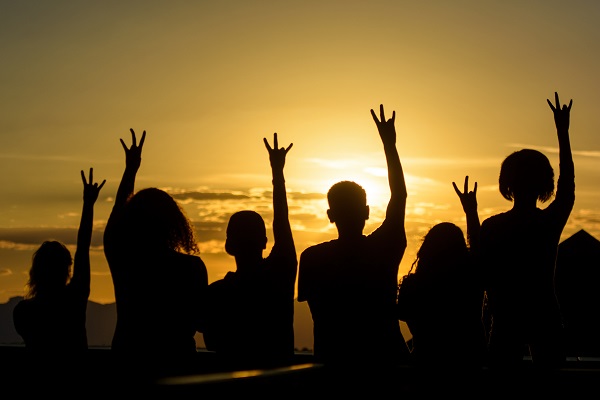ASU grad student prepares for a career in social work
ASU grad Madeline Sarussi said she’s learned not to be afraid of change. After studying something unrelated to her bachelor’s degree, Sarussi discovered her passion for helping children. In December, she graduated from ASU with a master’s in social work, which set the stage for a career doing what she loves.
Sarussi came to ASU seeking her master’s after spending her undergraduate years studying marketing at Grand Canyon University. In her time as a Sun Devil, she also worked as a management intern for Access ASU and Educational Outreach, which gave her real-world experiences working in schools. Access ASU works to increase access to higher education in Arizona, especially for underserved students.
As part of her job, Sarussi has gone to schools all over the Valley to help make sure that their students are informed about and prepared for postsecondary education. She has also helped with a number of ASU Outreach programs such as the American Dream Academy, the Hispanic Mother-Daughter Program, Future Sun Devil Family Day and Barrett Summer Scholars.

Q: What was your “aha” moment, when you realized you wanted to study the field you majored in?
A: During my undergrad, I got my bachelor’s degree in marketing, so it's really different from social work. I think that I knew that I wanted to work in schools, so I was looking into different areas such as being a school counselor.
When I found out that with social work you could be a school social worker and there's so many different things you can do, I wanted to pursue that. There's so many fields you can work in such as hospitals, schools and general behavioral health agencies. There's a lot of range.
Q: What’s something you learned while at ASU — in the classroom or otherwise — that surprised you, that changed your perspective?
A: I think that I’ve learned a lot about a trauma-informed approach to things and just learning how early childhood trauma is really impactful to students who I’ll be working with.
I feel like that's really shaped the way that I now interact with students and can understand where they’re coming from and understanding their stories better and be able to understand them with a more empathetic response because of that.
Q: Why did you choose ASU?
A: I lived in Arizona already and it's the only school that has a master’s in social work. It is a really good school. After I came here, I found out how many people had come from other states to attend the MSW program. It's a really well-known program, and it's affordable.
Q: Which professor taught you the most important lesson while at ASU?
A: Probably Mike Greenwell. I have taken a couple classes with him, and he teaches a lot about trauma. He still works in the field and I feel like he's given me a lot of practical ways to provide interventions for kids in therapy settings. He is definitely the most engaging and knowledgeable professor that I’ve had.
Q: What’s the best piece of advice you’d give to those still in school?
A: I would say that things can change, even if you’re in a program where you are not sure where you’re headed. There’s a lot of room for still figuring out what you’re going to do.
When I was in my undergrad, I felt kind of trapped like “oh my gosh, I’m changing again.” But I am definitely glad I did because social work is a passion for me, and marketing was not really a passion.
You can change your mind as many times as you want. Even when you’ve graduated with an undergrad degree, there’s still room to shift your focus and transition into a completely different field of work if you want to.
Q: What was your favorite spot on campus, whether for studying, meeting friends or just thinking about life?
A: All my classes were in UCent on the Downtown Campus, and that was good. I enjoyed walking on the Downtown campus. Even just working there, I would often walk from work in Mercado to UCent, which was my commute to class. That walk was really nice, to have that time to think and debrief my day.
Q: What are your plans after graduation?
A: I actually don’t have any confirmed plans yet. I am hoping to work in a behavioral agency or a school. With the coronavirus, it’s going to be interesting to see how agencies are able to adjust, because typically they are nonprofits, and many of them are on hiring freezes right now.
I’m thinking maybe I might be working in a school, if the opportunity presents itself. My internship has been with Southwest Behavioral Health but in a school because we offer school-based behavioral therapy. I was hoping to continue in the area, but unfortunately, they are not hiring anyone for at least a few months. I’m looking for other agencies where I can find something similar, but we’ll see. I think I’ll keep working at ASU for a little bit longer if I can.
Q: If someone gave you $40 million to solve one problem on our planet, what would you tackle?
A: I would probably invest in Arizona public education. Also being able to integrate more social and emotional support into those schools and allow teachers to have professional development in trauma and also provide additional support in schools, such as after-school care and family support, if necessary.